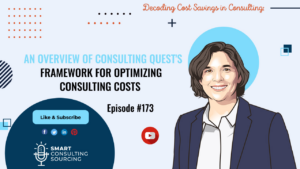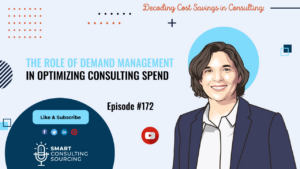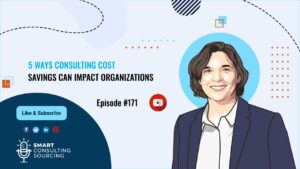Welcome back, dear listeners, to another captivating episode of Smart Consulting Sourcing, the ultimate podcast dedicated to the world of consulting procurement. I’m your host, Helene, and I’m absolutely thrilled to have you join us today as we continue our exploration of “How to buy consulting services like a pro.”
In this episode, we’re delving into the fascinating world of pitch sessions with consultants, a critical step in refining your evaluation of consulting proposals. Get ready for an episode filled with insights, strategies, and expert advice that will empower you to make informed decisions and choose the perfect consulting partner.
Before we plunge into today’s captivating topic, let’s take a moment to recap the valuable insights we’ve gathered over the past three episodes. These key points will serve as our compass as we navigate the pitch sessions:
First and foremost, resist the temptation to rush through the evaluation process. Take your time to carefully assess the written proposals, as this is the crucial first step in selecting the right consultant for your project. Thoroughly review, grade, and identify the most promising proposals that align with your objectives.
Remember, it’s not just about finding the most brilliant or cheapest proposal. Your ultimate goal is to identify a consultant who possesses the capability to solve your specific problem and address your unique needs.
While consultants are renowned for their ability to quickly grasp business challenges, it’s essential to dig deeper and evaluate whether their skills and expertise are truly aligned with your expectations. Look beyond the surface and ensure they have what it takes to deliver exceptional results.
Consider the fit between the consulting firm and your teams. Envision how the collaboration would unfold and evaluate if the dynamics are harmonious. If you can’t picture a seamless partnership, it may be an indication that the consulting firm isn’t the right fit for your organization.
Last but certainly not least, closely examine the proposed price and determine if it falls within your budget. Evaluate the value you expect to derive from the project and carefully assess if the investment is justifiable. Strike a balance between your financial constraints and the desired outcomes.
If you’ve missed the previous episodes and would like to listen to them before diving into today’s topic, you’re in luck! You can find all our past episodes on various platforms like Spotify, iTunes, or YouTube. Simply search for “Smart Consulting Sourcing” and select the episode you’d like to catch up on.
If reading is more your style, don’t worry, I’ve got you covered as well! You can find the full transcripts of our past episodes in the Thought Leadership section of consultingquest.com. It’s a great way to catch up on all the valuable information and insights we’ve discussed so far. And remember, don’t hesitate to share it with your friends and colleagues who might also benefit from the knowledge shared in our podcast.
Pitching Session: Where the Consulting Proposal Evaluation Process Moves to Face-to-Face Interaction
Now, it’s time to dive into the thrilling world of pitch sessions! By this point, you likely have a preliminary opinion about which proposal best aligns with your needs. Through the proposal assessment process, we discussed in the previous episodes, you must have gained valuable insights into what the consulting firm can offer you on paper. However, it’s important to remember that not all companies excel at both selling their services and delivering exceptional value.
Now, it’s time to address any lingering questions or uncertainties you may have about the most promising proposals. Schedule one-on-one meetings with your short-listed consultants to delve deeper into their offerings. Whenever possible, aim to meet them in person, especially if they are new to your company. Face-to-face interactions provide an invaluable opportunity to gauge their understanding of your needs, their communication skills, and their ability to build rapport with your team.
So, get those calendars out, start scheduling those meetings, and prepare to engage in insightful discussions with your potential consulting partners. These pitch sessions are the perfect opportunity to clarify any remaining doubts and solidify your decision-making process. Let’s dive in and make the most out of these meetings!
Finetuning Selection Criteria
Now, let’s prepare for the final hurdle by refining our criteria for selecting the best proposal. When you initially prepared the Request for Proposal (RFP), you likely listed the criteria that would guide your decision-making process. These criteria will serve as your starting point for comparing the remaining proposals.
Typically, the list of criteria includes elements such as:
- Quality of the approach
- Team expertise
- Quality of the proposal
- Price
- Fit with your teams
You may have also identified more specific criteria, such as expertise in a particular sub-industry or sub-capability, availability to work on-site, or the ability to transfer knowledge. These additional criteria further refine your evaluation.
In addition to these requirements, there may be other dimensions that are important to you but were not explicitly mentioned in the RFP. These could include factors like alignment with your values, creativity and innovation, or credibility with your local teams. These aspects reflect your organization’s unique culture and expectations.
But hold your horses, we can’t just dive in willy-nilly! We need to prioritize our criteria. After all, we’re not just looking for a flashy proposal, we’re after project success!
So, think about the context and expected results of your project. What matters most? Is it the quality of the approach, the team’s expertise, the proposal itself, or maybe the ever-important price tag? It’s like a carefully crafted recipe—you need to know which ingredients take center stage.
But here’s the kicker: priorities can change from project to project. It’s like dancing to the beat of a different drum each time. So, put on your thinking caps and determine what really matters for this particular project. Remember, success is the name of the game!
Establishing an Evaluation Matrix
Once you’ve figured out your priorities, it’s time to whip out that evaluation matrix. This nifty tool will help you assign scores to the different proposals, making comparisons a piece of cake. By following your priorities and using the evaluation matrix, you’ll be equipped to make a well-informed decision that aligns perfectly with your project’s goals and requirements.
Let the Spotlight Shine on the Consultants During the Pitching Session
Now, it’s time to give the consultants their moment in the spotlight. After all, it’s only fair to let them provide their valuable insights and clarifications on their proposals. You see, writing a proposal is no easy task. Despite your best efforts in crafting a detailed RFP, there may still be elements that remain unclear. It’s a delicate dance between the quality of the RFP, the briefings provided, and the expertise of the consultants themselves.
During the pitch sessions, give the consultants the opportunity to address any uncertainties or gaps that you may have identified in their proposals. Encourage open dialogue and ask them to elaborate on specific points or provide further clarification. This is your chance to gain a deeper understanding of their approach, expertise, and how well they truly grasp the essence of your project.
Ask Questions to Determine If the Firm Truly Possesses Requisite Expertise
It’s time to challenge the core proposals presented by the consultants. Take a moment to reflect on your analysis of the proposals and jot down the questions you want to ask. Here’s a handy tip: save your preferred proposal for last. Why, you ask? Well, by the time you reach that point, you will have already seen other presentations, assessed strengths and weaknesses, and undoubtedly gathered a plethora of questions.
This is a good time to use the questions you have created while reading the proposals. Here are some examples to help you get started:
- Does the proposal cover all the scope outlined in the RFP? Are there any gaps or missing elements that need clarification?
- How satisfied are you with the quality of the approach proposed by the consultant? Does it align with your expectations and address the specific needs of your project?
- Do you believe that the proposed approach will have a positive impact on the project? Does it demonstrate a deep understanding of your challenges and offer innovative solutions?
- Are the deliverables outlined in the proposal relevant and aligned with your desired outcomes? Do they provide a clear roadmap for achieving your project goals?
- Is the proposed timeline realistic and in line with your expectations? Are there any potential bottlenecks or concerns that need to be addressed?
- During the oral presentation of the proposal, were you convinced by the consultant’s communication style and ability to convey their ideas effectively? Did they inspire confidence in their expertise and capabilities?
Now it’s time to challenge the expertise of the consultants in the room. Writing the perfect proposal with the support of experts is one thing, but pitching that proposal without their assistance is a different ball game. Many consulting firms include subject matter experts in their proposals to enhance their technical credibility. However, it’s important to ensure that the expertise they claim is genuine and not just smoke and mirrors.
Here are some key questions to evaluate the expertise of the consultants:
- Who will be the consultants working with you on a daily basis?
- Did they demonstrate a clear understanding of the context and objectives of the project?
- Do they possess a deep understanding of your industry and market?
- Will you have access to their knowledge and expertise throughout the project?
- Will they be credible with your technical teams? Consider the consultants’ ability to establish rapport and gain the trust of your internal technical teams, as effective collaboration is crucial for project success.
- Do you believe they will bring the competencies and expertise you are looking for?
What is their experience prior to this project? Explore the consultants’ professional backgrounds and assess if their past experiences align with the needs of your project.
Have they been directly involved in the referenced projects mentioned in their proposal? Validate whether the consultants have played an active role in the projects they have referenced, as this provides insights into their actual experience.
Now, let’s delve into a critical aspect that can’t be assessed on paper: the chemistry with the consultants. While technical competencies and expertise are important for project success, the behaviour and working style of the consultants plays a significant role as well.
Also, consider the following questions to evaluate the consultants’ fit with your organization:
- What is the personality of the partner in charge of the project manager? Assess whether their personality aligns with the dynamics of your organization and project.
- Can you envision your project sponsor, project manager, and teams working well with the consultants? Compatibility and collaboration are essential for a smooth working relationship.
- Do the consultants actively listen to your needs and concerns? Evaluate their willingness to adapt and be flexible in their approach based on your specific requirements.
- Do the consultants exhibit values that are compatible with yours? Assess if their values align with your organization’s culture and principles.
- Do you believe they will have credibility with upper management? Consider if the consultants’ expertise and communication style will resonate with senior executives and decision-makers.
- Will they be able to build trust with the main stakeholders? Trust is crucial for effective collaboration and achieving project goals.
- Do you feel that the consultants strike a balance between sales imperatives and delivery commitments? Assess if they prioritize both the commercial aspect and the successful execution of the project.
- Do you think their overall posture, personality, and cultural approach will have a positive impact on your project? Consider the consultants’ overall demeanor and how it may influence project dynamics and team morale.
Now that you’ve grilled the consultants with your questions, it’s time to give them a chance to revise their proposals. The purpose of this exercise is to receive several solid proposals that you can choose from. You want the most promising candidates to submit their best and most refined proposal.
Allow A Few Days for Feedback Incorporation After Pitching
During the meetings, you may have asked for clarifications or requested modifications. Allow the consulting firms a few days to integrate your demands and adjust the price if necessary. This period allows them to fine-tune their proposals based on your feedback and ensure that all aspects are well-aligned with your expectations.
Remember, the Request for Proposal (RFP) and the proposal itself serve as the foundation for the project and potential future litigation. It is crucial to ensure that they accurately describe the work you expect to be done and the agreed-upon team composition.
And if you haven’t done so already, now is the perfect time to conduct reference checks. Checking references is a valuable step in the evaluation process as it provides insights into the consultants’ past performance and their ability to deliver on their promises.
And if you still have lingering doubts about certain aspects of the proposal or the consultants’ expertise, reaching out to their references can be a great way to find some answers. References can provide valuable insights and firsthand experiences that can help address any remaining concerns or uncertainties.
Key Learnings From This Episode
That’s a wrap on the pitch sessions! Before we conclude today’s episode, let’s take a moment to recap the key learnings:
Challenging the core proposal: Start by analyzing the proposals and asking questions to clarify any uncertainties or weaknesses.
Evaluating the expertise: Assess the qualifications and experience of the consultants who will be working on the project. Ensure they understand your context, objectives, and have the necessary industry knowledge.
Assessing the fit and behavior: Consider the consultants’ personality, communication style, and compatibility with your team. Look for values alignment and their ability to build credibility and trust with stakeholders.
Allowing revisions: Give the consulting firms a few days to revise their proposals based on your clarifications and modifications. This allows them to integrate your demands and adjust the price if needed.
Checking references: If you still have doubts, reaching out to the consultants’ references can provide valuable insights and firsthand experiences to address any remaining concerns.
Remember, the goal of the pitch sessions is to identify the most promising candidates with solid proposals. The evaluation process helps you make an informed decision and select the consultants who are the best fit for your project.
Get ready for an exciting episode next week as we delve into the process of selecting your consultants. We’ll uncover the mysteries behind deciphering commercial proposals, exploring the essential elements and key factors that will guide you in making the best choice for your project. Get ready for an insightful and informative ride you won’t want to miss!
Till then, stay safe and happy sourcing and if you have any questions regarding today’s topic or any consulting procurement-related matters, remember you can always contact me directly on LinkedIn or by email because I’m always game for a chat.
Bye and see you next week, au revoir.







